Unit 9 I like music that I can dance to 单元教学案(4课时)
文档属性
| 名称 | Unit 9 I like music that I can dance to 单元教学案(4课时) | 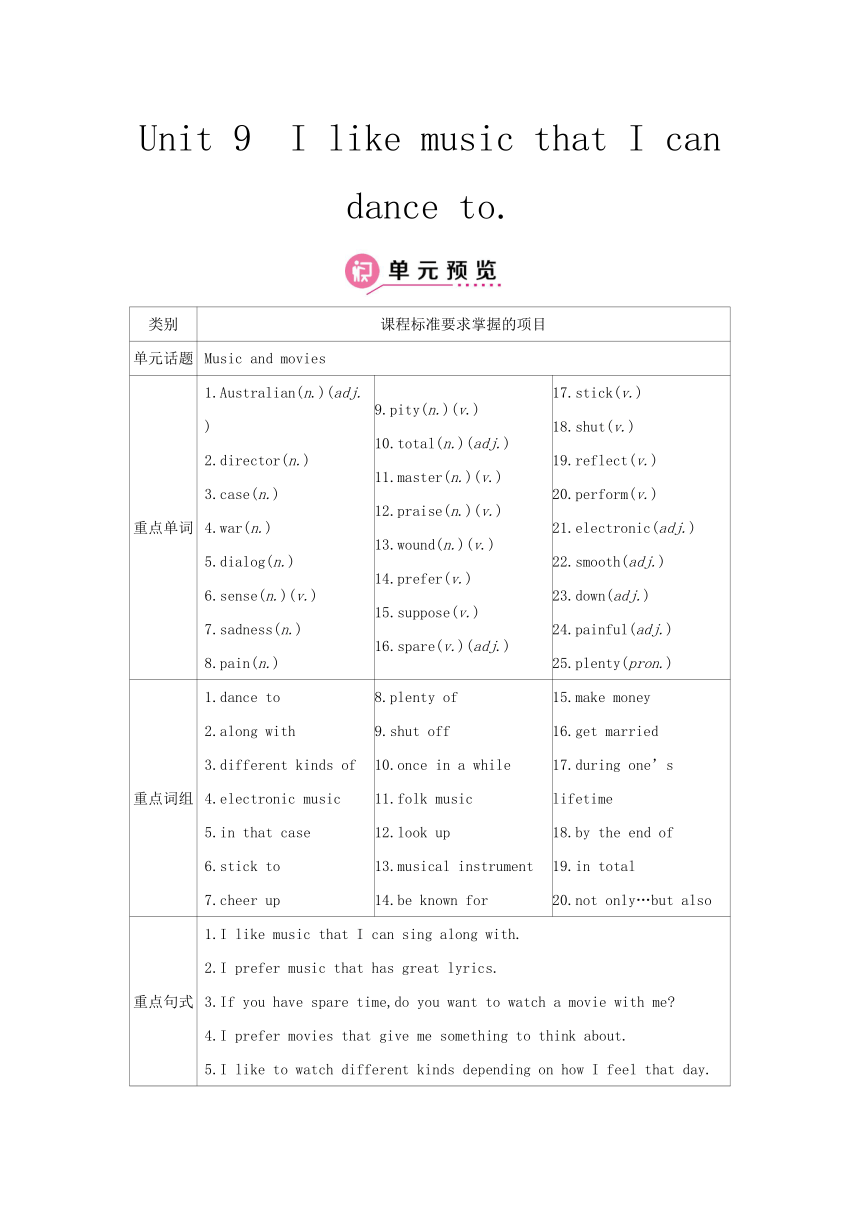 | |
| 格式 | docx | ||
| 文件大小 | 81.6KB | ||
| 资源类型 | 教案 | ||
| 版本资源 | 人教新目标(Go for it)版 | ||
| 科目 | 英语 | ||
| 更新时间 | 2021-09-11 14:07:33 | ||
图片预览

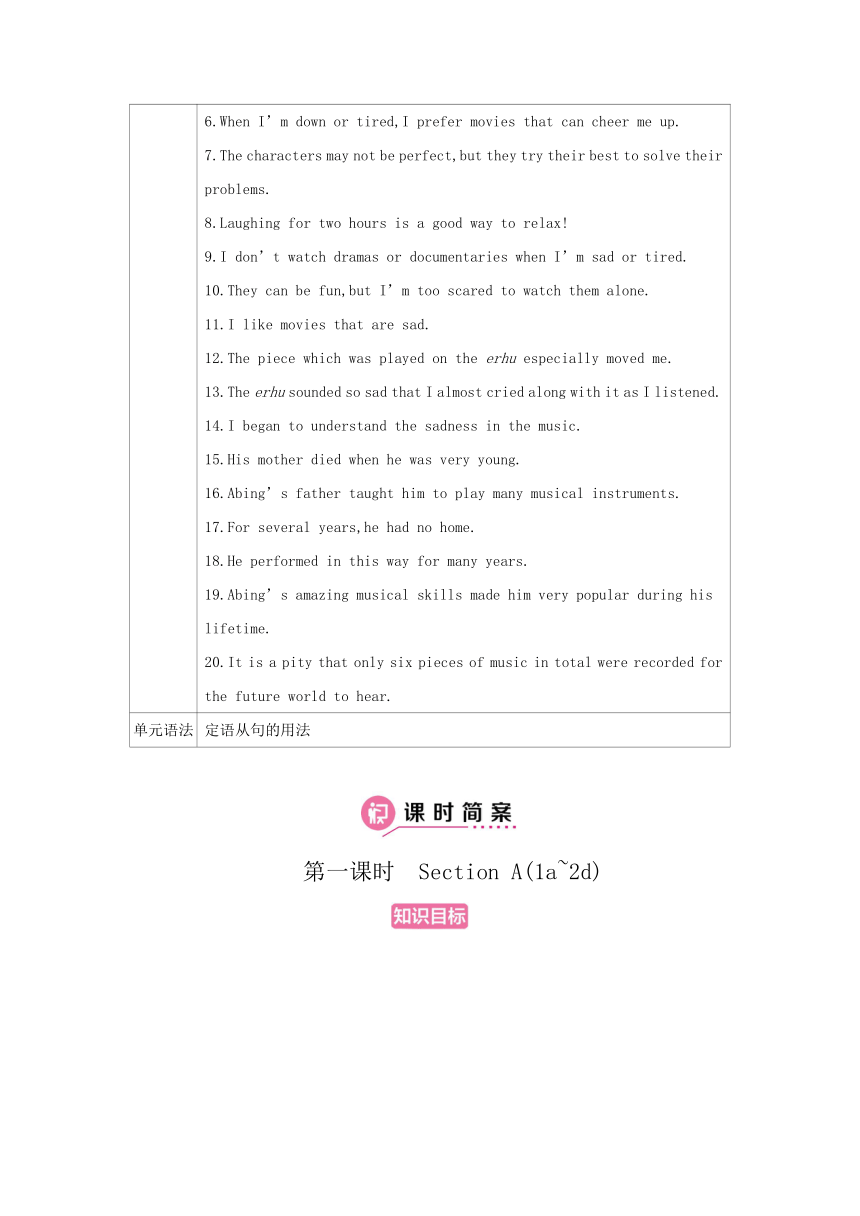
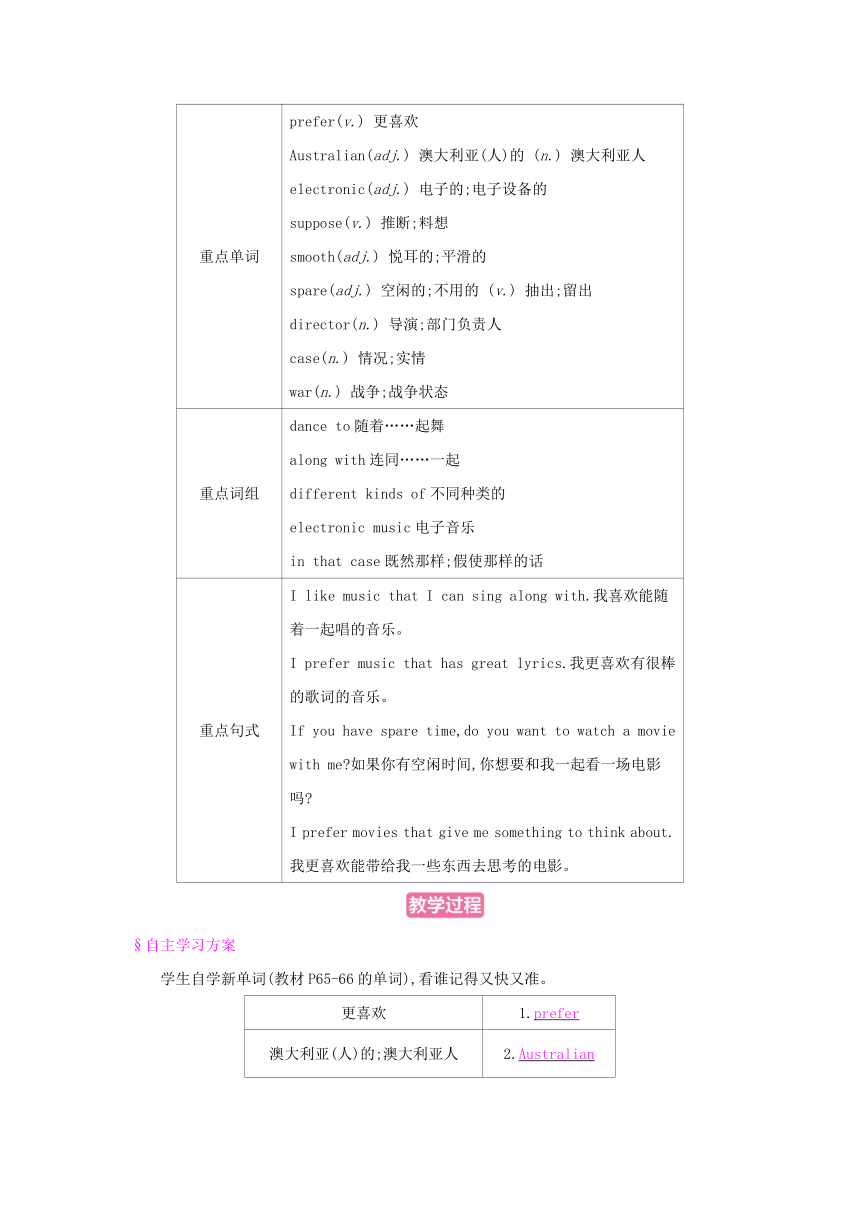
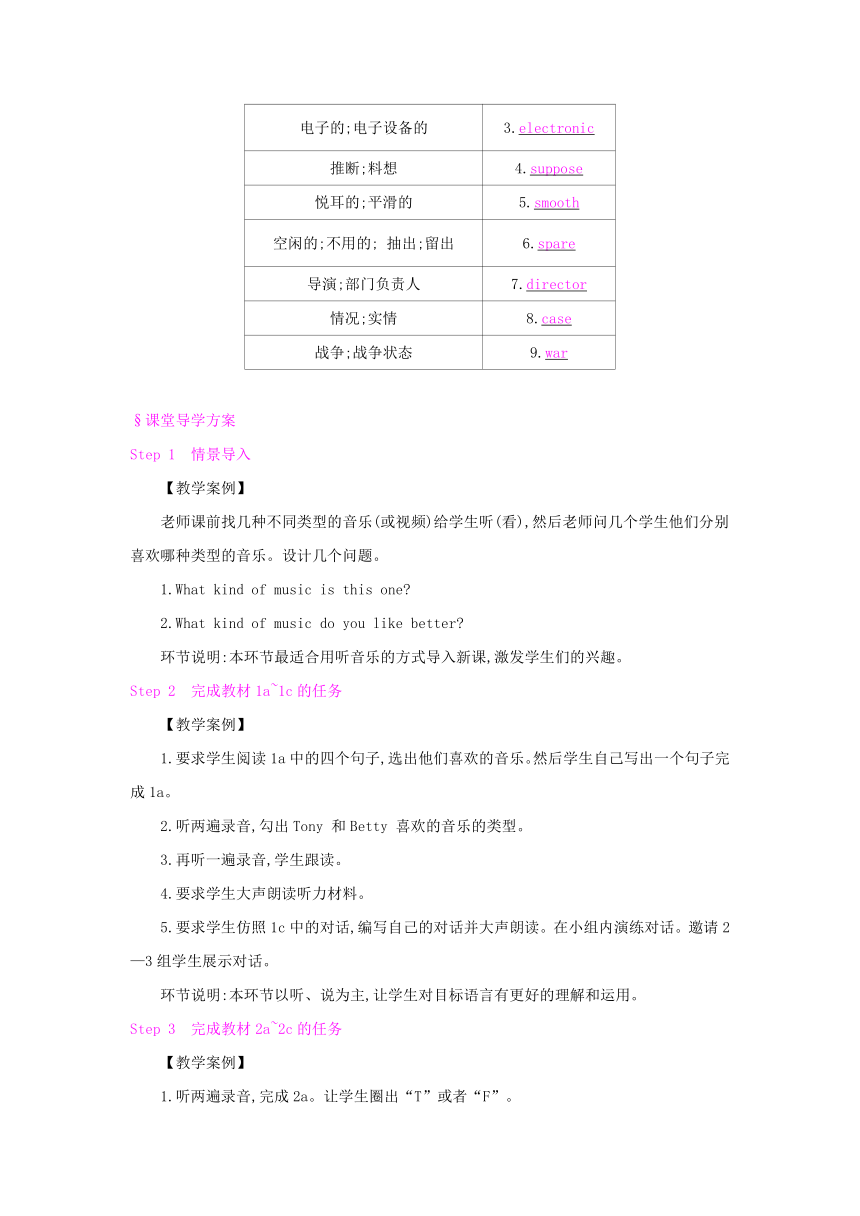
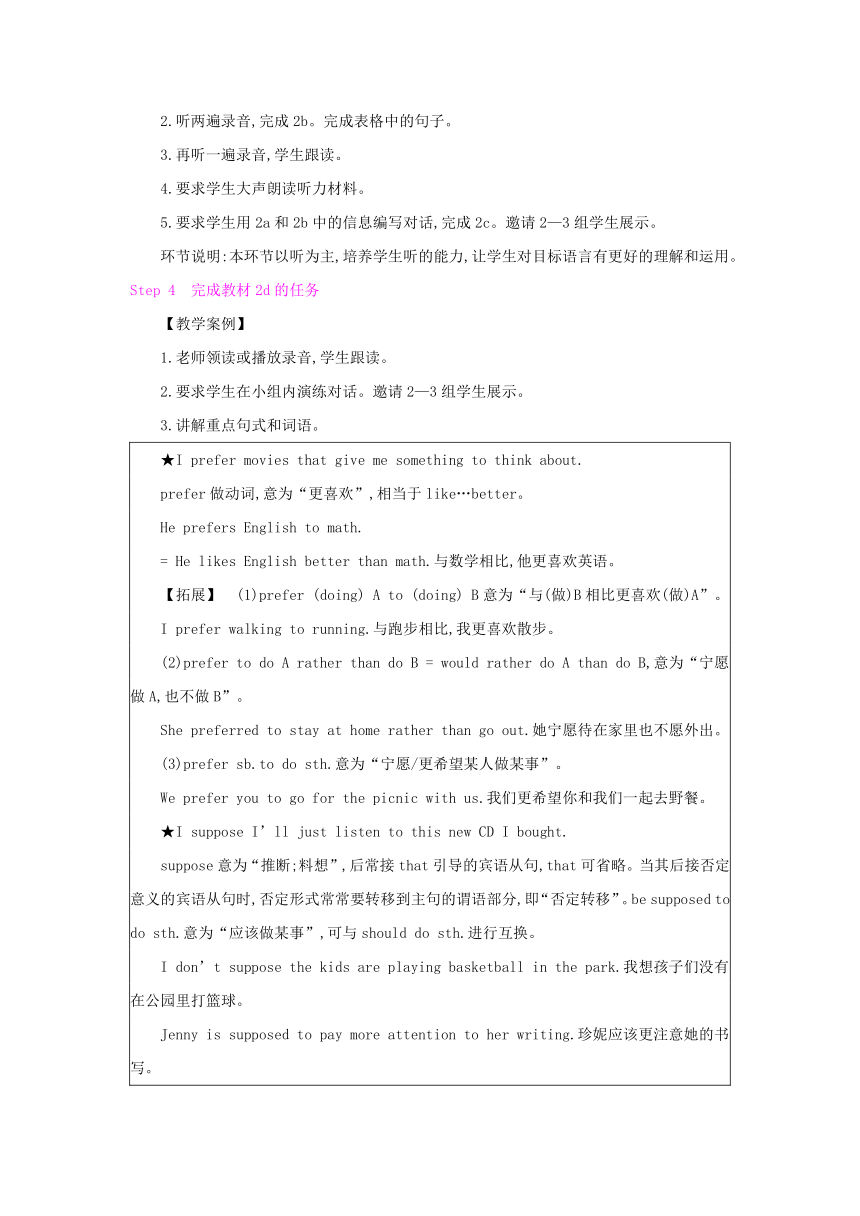
文档简介
Unit
9
I
like
music
that
I
can
dance
to.
类别
课程标准要求掌握的项目
单元话题
Music
and
movies
重点单词
1.Australian(n.)(adj.)
2.director(n.)
3.case(n.)
4.war(n.)
5.dialog(n.)
6.sense(n.)(v.)
7.sadness(n.)
8.pain(n.)
9.pity(n.)(v.)
10.total(n.)(adj.)
11.master(n.)(v.)
12.praise(n.)(v.)
13.wound(n.)(v.)
14.prefer(v.)
15.suppose(v.)
16.spare(v.)(adj.)
17.stick(v.)
18.shut(v.)
19.reflect(v.)
20.perform(v.)
21.electronic(adj.)
22.smooth(adj.)
23.down(adj.)
24.painful(adj.)
25.plenty(pron.)
重点词组
1.dance
to
2.along
with
3.different
kinds
of
4.electronic
music
5.in
that
case
6.stick
to
7.cheer
up
8.plenty
of
9.shut
off
10.once
in
a
while
11.folk
music
12.look
up
13.musical
instrument
14.be
known
for
15.make
money
16.get
married
17.during
one’s
lifetime
18.by
the
end
of
19.in
total
20.not
only…but
also
重点句式
1.I
like
music
that
I
can
sing
along
with.
2.I
prefer
music
that
has
great
lyrics.
3.If
you
have
spare
time,do
you
want
to
watch
a
movie
with
me?
4.I
prefer
movies
that
give
me
something
to
think
about.
5.I
like
to
watch
different
kinds
depending
on
how
I
feel
that
day.
6.When
I’m
down
or
tired,I
prefer
movies
that
can
cheer
me
up.
7.The
characters
may
not
be
perfect,but
they
try
their
best
to
solve
their
problems.
8.Laughing
for
two
hours
is
a
good
way
to
relax!
9.I
don’t
watch
dramas
or
documentaries
when
I’m
sad
or
tired.
10.They
can
be
fun,but
I’m
too
scared
to
watch
them
alone.
11.I
like
movies
that
are
sad.
12.The
piece
which
was
played
on
the
erhu
especially
moved
me.
13.The
erhu
sounded
so
sad
that
I
almost
cried
along
with
it
as
I
listened.
14.I
began
to
understand
the
sadness
in
the
music.
15.His
mother
died
when
he
was
very
young.
16.Abing’s
father
taught
him
to
play
many
musical
instruments.
17.For
several
years,he
had
no
home.
18.He
performed
in
this
way
for
many
years.
19.Abing’s
amazing
musical
skills
made
him
very
popular
during
his
lifetime.
20.It
is
a
pity
that
only
six
pieces
of
music
in
total
were
recorded
for
the
future
world
to
hear.
单元语法
定语从句的用法
第一课时 Section
A(1a~2d)
重点单词
prefer(v.)
更喜欢
Australian(adj.)
澳大利亚(人)的
(n.)
澳大利亚人
electronic(adj.)
电子的;电子设备的
suppose(v.)
推断;料想
smooth(adj.)
悦耳的;平滑的
spare(adj.)
空闲的;不用的
(v.)
抽出;留出
director(n.)
导演;部门负责人
case(n.)
情况;实情
war(n.)
战争;战争状态
重点词组
dance
to随着……起舞
along
with连同……一起
different
kinds
of不同种类的
electronic
music电子音乐
in
that
case既然那样;假使那样的话
重点句式
I
like
music
that
I
can
sing
along
with.我喜欢能随着一起唱的音乐。
I
prefer
music
that
has
great
lyrics.我更喜欢有很棒的歌词的音乐。
If
you
have
spare
time,do
you
want
to
watch
a
movie
with
me?如果你有空闲时间,你想要和我一起看一场电影吗?
I
prefer
movies
that
give
me
something
to
think
about.我更喜欢能带给我一些东西去思考的电影。
§自主学习方案
学生自学新单词(教材P65-66的单词),看谁记得又快又准。
更喜欢
1.prefer
澳大利亚(人)的;澳大利亚人
2.Australian
电子的;电子设备的
3.electronic
推断;料想
4.suppose
悦耳的;平滑的
5.smooth
空闲的;不用的;
抽出;留出
6.spare
导演;部门负责人
7.director
情况;实情
8.case
战争;战争状态
9.war
§课堂导学方案
Step
1 情景导入
【教学案例】
老师课前找几种不同类型的音乐(或视频)给学生听(看),然后老师问几个学生他们分别喜欢哪种类型的音乐。设计几个问题。
1.What
kind
of
music
is
this
one?
2.What
kind
of
music
do
you
like
better?
环节说明:本环节最适合用听音乐的方式导入新课,激发学生们的兴趣。
Step
2 完成教材1a~1c的任务
【教学案例】
1.要求学生阅读1a中的四个句子,选出他们喜欢的音乐。然后学生自己写出一个句子完成1a。
2.听两遍录音,勾出Tony
和Betty
喜欢的音乐的类型。
3.再听一遍录音,学生跟读。
4.要求学生大声朗读听力材料。
5.要求学生仿照1c中的对话,编写自己的对话并大声朗读。在小组内演练对话。邀请2—3组学生展示对话。
环节说明:本环节以听、说为主,让学生对目标语言有更好的理解和运用。
Step
3 完成教材2a~2c的任务
【教学案例】
1.听两遍录音,完成2a。让学生圈出“T”或者“F”。
2.听两遍录音,完成2b。完成表格中的句子。
3.再听一遍录音,学生跟读。
4.要求学生大声朗读听力材料。
5.要求学生用2a和2b中的信息编写对话,完成2c。邀请2—3组学生展示。
环节说明:本环节以听为主,培养学生听的能力,让学生对目标语言有更好的理解和运用。
Step
4 完成教材2d的任务
【教学案例】
1.老师领读或播放录音,学生跟读。
2.要求学生在小组内演练对话。邀请2—3组学生展示。
3.讲解重点句式和词语。
★I
prefer
movies
that
give
me
something
to
think
about.
prefer做动词,意为“更喜欢”,相当于like…better。
He
prefers
English
to
math.
=
He
likes
English
better
than
math.与数学相比,他更喜欢英语。
【拓展】 (1)prefer
(doing)
A
to
(doing)
B意为“与(做)B相比更喜欢(做)A”。
I
prefer
walking
to
running.与跑步相比,我更喜欢散步。
(2)prefer
to
do
A
rather
than
do
B
=
would
rather
do
A
than
do
B,意为“宁愿做A,也不做B”。
She
preferred
to
stay
at
home
rather
than
go
out.她宁愿待在家里也不愿外出。
(3)prefer
sb.to
do
sth.意为“宁愿/更希望某人做某事”。
We
prefer
you
to
go
for
the
picnic
with
us.我们更希望你和我们一起去野餐。
★I
suppose
I’ll
just
listen
to
this
new
CD
I
bought.
suppose意为“推断;料想”,后常接that引导的宾语从句,that可省略。当其后接否定意义的宾语从句时,否定形式常常要转移到主句的谓语部分,即“否定转移”。be
supposed
to
do
sth.意为“应该做某事”,可与should
do
sth.进行互换。
I
don’t
suppose
the
kids
are
playing
basketball
in
the
park.我想孩子们没有在公园里打篮球。
Jenny
is
supposed
to
pay
more
attention
to
her
writing.珍妮应该更注意她的书写。
4.小结训练。
将下列句子中汉语部分译成英语,注意使用适当的形式。
(1)
When
he
listens
to
music,Jim
often sings
along
with
it.(跟着……唱)?
(2) In
that
case ,we’ll
have
to
wait
for
another
two
days.(既然那样)?
(3)If
you have
spare
time ,you
can
take
up
a
hobby.(有空闲时间)?
(4)
Take
a
look
at
the
video
and
you’ll
know
what
I
mean .(我的意思)?
(5)I
prefer
to
food
that
is
made
by
my
mother
at
home.(更喜欢……食物)?
环节说明:本环节以读、练为主,加强对目标语言的巩固和运用。
第二课时
Section
A
(3a~4c)
重点单词
stick
(v.)粘贴;将……刺入
down
(adj.)悲哀;沮丧
dialog(n.)对话;对白
plenty(pron.)大量;众多
shut
(v.)关闭;关上
重点词组
stick
to坚持;固守
cheer
up使振奋
plenty
of大量;充足
shut
off关闭;停止运转
once
in
a
while偶尔地;间或
重点句式
I
like
to
watch
different
kinds
depending
on
how
I
feel
that
day.根据我当天的感受,我喜欢观看不同种类的电影。
When
I’m
down
or
tired,I
prefer
movies
that
can
cheer
me
up.当我沮丧或疲倦时,我更喜欢看能使我振奋的电影。
The
characters
may
not
be
perfect,but
they
try
their
best
to
solve
their
problems.人物可能不完美,但是他们都尽力解决他们的问题。
Laughing
for
two
hours
is
a
good
way
to
relax!笑两个小时是一种很好的放松方式!
I
don’t
watch
dramas
or
documentaries
when
I’m
sad
or
tired.当我悲伤或疲倦时,我不看戏剧或纪录片。
They
can
be
fun,but
I’m
too
scared
to
watch
them
alone.它们可能很有趣,但是我太害怕了,不敢独自看它们。
§自主学习方案
学生自学新单词(教材P67-68的单词),看谁记得又快又准。
粘贴;将……刺入
1.stick
悲哀;沮丧
2.down
对话;对白
3.dialog
大量;众多
4.plenty
关闭;关上
5.shut
§课堂导学方案
Step
1 情景导入
【教学案例】
本课时的主要内容是关于几种类型的电影的评论。在学习之前老师需要准备几个问题,来引导学生学习课文。
1.Who
is
your
favorite
film
star?
2.What
kind
of
movie
do
you
like
best?
3.Why
do
you
like
this
kind
of
movie?
环节说明:本环节用师生互动的方式导入新课,激发同学们的学习兴趣。让学生带着问题阅读课文,给学生学习的动力。
Step
2 完成教材3a~3c的任务
【教学案例】
1.要求学生默读课文,圈出不同类型的电影及电影的名字。完成3a。
2.老师领读或播放录音,学生跟读。
3.要求学生大声朗读课文。邀请2—3个学生分段落朗读课文。
4.再次默读课文,回答4个问题。在小组内讨论答案。完成3b。邀请2个学生读出答案。老师订正答案。
5.在小组内讨论3c中的内容,完成表格。
6.讲解重点句式和词语。
★While
some
people
stick
to
only
one
kind
of
movie,I
like
to
watch
different
kinds
depending
on
how
I
feel
that
day.
stick
to意为“坚持;坚守”,to是介词,其后通常接表示“目标、观点、原则、计划”等的名词。
You
should
stick
to
the
promise
that
you
have
made.你应该坚守自己的诺言。
★Documentaries
like
March
of
the
Penguins
which
provide
plenty
of
information
about
a
certain
subject
can
be
interesting,but
when
I’m
tired
I
don’t
want
to
think
too
much.
plenty
of意为“大量;充足”,相当于
a
lot
of
/
lots
of
,其后既可以接不可数名词,也可以接可数名词。
Don’t
worry!We
have
plenty
of
time.别担心!我们有足够的时间。
环节说明:本环节以读为主,培养学生读的能力,让学生在读的过程中对目标语言有更好的理解。
Step
3 完成教材Grammar
Focus~4c的任务
【教学案例】
1.要求学生大声朗读Grammar
Focus中的句子。
2.要求学生总结出定语从句的构成,老师加以引导。
3.要求学生从不同栏中选择单词造句。完成4a。邀请2—3个学生读出自己写的句子。
4.要求学生阅读Jennifer的光盘简介,然后用that,which
或who写出含有定语从句的句子。在小组内讨论自己的句子,然后全班一起订正。
5.仿照4c中的对话编写关于自己喜欢和不喜欢的事物的对话。在小组内讨论对话。邀请2—3个学生读出自己的对话。
6.小结训练。
将下列句子中汉语部分译成英语,注意使用适当的形式。
(1)He
looks
unhappy.Let’s
do
something
to
cheer
him
up
.(让他振作起来)?
(2)I
play
tennis
with
my
friends
once
in
a
while
on
weekends.(偶尔)?
(3)This
problem
seems
less
serious
.(不那么严重)?
(4)They
are
trying
their
best
to
solve
this
problem.(尽力)?
(5)Helen
isn’t
afraid
of
the
dark
and
she
often
goes
out
in
the
evening.(不害怕)?
环节说明:本环节以自学为主,培养学生的学习能力,加强学生对定语从句的理解和运用。
第三课时
Section
B
(1a~1d)
重点句式
He
likes
clothes
that
are
unusual.他喜欢不寻常的衣服。
I
like
movies
that
are
sad.我喜欢悲伤的电影。
§自主学习方案
根据句意,用括号中所给词的适当形式填空。
(1)She
likes
clothes
that
are
unusual.(be)
?
(2)Jack
likes
writers
who
explain
things
well .(good)
?
(3)I
like
movies
that
are
scary.(movie)
?
(4)I
really
like
the
food
that
is
sweet.(real)
?
(5)I
suppose
I’ll
finish
doing
my
homework
in
an
hour.(do)
?
§课堂导学方案
Step
1 情景导入
【教学案例】
在前面的课上我们已经学习了一些关于音乐方面的内容和同学们喜爱的音乐的类型。老师可设置几个问题来进行一下简单的回顾。
1.Do
you
have
your
favorite
band?What
is
it?
2.How
many
members
are
there
in
the
band?
3.Which
song
of
theirs
do
you
like
best?
环节说明:本环节以问题的方式引入师生互动,回顾自己喜欢的音乐的类型,强化对目标语言的理解。
Step
2 完成教材1a~1c的任务
【教学案例】
1.填表,写出你最喜欢的电影、书和乐队的名字。完成1a。邀请2—3个学生读出他们的答案。
2.听两遍录音,在第一栏中写出Michael喜欢的三种东西。在第二栏中写出Michael为什么喜欢这三种东西。完成1b。
3.听一遍录音,学生跟读。
4.要求学生大声朗读听力材料,邀请1—2组学生分角色演练这个对话。
环节说明:本环节以听为主,培养学生听的能力,强化对目标语言的理解。
Step
3 完成教材1d的任务
【教学案例】
1.要求学生用1a中的信息,仿照1d中的内容编写对话。
2.要求学生在小组内讨论自己所写的对话。邀请2—3组学生演练所编写的对话。
环节说明:本环节以说为主,培养学生说的能力,强化对目标语言的运用。
第四课时 Section
B(2a~Self
Check)
重点单词
sense(v.)
感觉到;意识到
(n.)
感觉;意识
sadness
(n.)
悲伤;悲痛
pain(n.)
痛苦;疼痛;苦恼
reflect(v.)
反映;映出
perform(v.)
表演;执行
pity(n.)
遗憾;怜悯
(v.)
同情;怜悯
total(n.)
总数;合计
(adj.)
总的;全体的
master(n.)
大师;能手;主人
(v.)
掌握
praise(v.&
n.)
表扬;赞扬
wound(n.)
伤;伤口;创伤
(v.)
使(身体)受伤;伤害
painful
(adj.)
令人痛苦的;
令人疼痛的
重点词组
folk
music民间音乐
look
up查询
musical
instrument乐器
be
known
for以……著名
make
money挣钱
get
married结婚
during
one’s
lifetime一生中
by
the
end
of到……时为止
in
total总共
not
only
…but
also
不仅……而且
重点句式
The
piece
which
was
played
on
the
erhu
especially
moved
me.用二胡演奏的那首曲子尤其使我感动。
The
erhu
sounded
so
sad
that
I
almost
cried
along
with
it
as
I
listened.二胡听起来是那样的悲伤,当我听的时候,我几乎随着它的音乐哭了。
I
began
to
understand
the
sadness
in
the
music.我开始理解音乐里的悲伤感情。
His
mother
died
when
he
was
very
young.在他很小的时候,他的妈妈就去世了。
Abing’s
father
taught
him
to
play
many
musical
instruments.阿炳的父亲教他演奏许多乐器。
For
several
years,he
had
no
home.在长达几年的时间里,他没有家。
He
performed
in
this
way
for
many
years.他用这种方式表演了许多年。
Abing’s
amazing
musical
skills
made
him
very
popular
during
his
lifetime.阿炳令人惊叹的音乐技能使他在有生之年很出名。
It
is
a
pity
that
only
six
pieces
of
music
in
total
were
recorded
for
the
future
world
to
hear.遗憾的是,一共只有六首曲子被记录下来得以传世。
§自主学习方案
学生自学新单词(教材P70-72的单词),看谁记得又快又准。
感觉到;意识到;感觉;意识
1.sense
痛苦;疼痛;苦恼
2.pain
反映;映出
3.reflect
表演;执行
4.perform
遗憾;怜悯;同情;怜悯
5.pity
总数;合计;总的;全体的
6.total
大师;能手;主人;掌握
7.master
表扬;赞扬
8.praise
伤;伤口;创伤;使(身体)受伤;伤害
9.wound
令人痛苦的;
令人疼痛的
10.painful
§课堂导学方案
Step
1 情景导入
【教学案例】
本文是一篇介绍艺术家阿炳的记叙文,在学习课文之前参照2a准备几个与短文相关的问题,然后邀请几位学生给出自己的答案。
1.How
many
Chinese
musical
instruments
do
you
know
about?
2.What
musical
instrument
do
you
use?
3.Do
you
know
any
famous
pieces
of
music
that
are
played
on
these
instruments?
环节说明:本环节以问题的形式导入新课,让学生带着问题学课文,激发学生的学习动力。
Step
2 完成教材2b~2e的任务
【教学案例】
1.要求学生默读课文,回答三个问题。邀请2—3个学生读出他们的答案。完成2b。
2.老师领读或播放录音,学生跟读。
3.找几个学生分段落朗读课文。
4.要求学生再次默读课文,找出每个段落的主要观点,并找出支持该观点的细节,完成2c。邀请2—3个学生读出他们的答案。
5.圈出that
或who,并且用方框中所给的词填空,完成2d。邀请2—3个学生读出他们的答案。
6.让学生分角色演练,一个扮演外国游客,一个扮演中国学生,模仿2e中的对话进行演练。邀请2—3组学生展示。
7.讲解重点句式和词语。
★The
music
was
strangely
beautiful,but
under
the
beauty
I
sensed
a
strong
sadness
and
pain.
sense做动词时,意为“感觉到;意识到”,其后可接名
词、代词或从句。sense做名词时,意为“感官;感觉”。常见搭配有:a
sense
of
achievement
/
humor
/
safety
/
direction
(成就感、幽默感、安全感、方向感)。
The
kids
sensed
danger
and
started
to
run.孩子们意识到危险开始逃跑。
Zhang
Wenhong
is
a
famous
doctor
with
a
strong
sense
of
humor.张文宏是一位很有幽默感的著名的医生。
★It
is
a
pity
that
only
six
pieces
of
music
in
total
were
recorded
for
the
future
world
to
hear,but
his
popularity
continues
to
this
day.
在It’s
a
pity
(that)
…句式中,It
是形式主语,真正的主语是that引导的从句。What
a
pity!常用于口语中,意为“真遗憾!”
It’s
a
pity
that
Wang
Mei
couldn’t
achieve
her
dream
of
becoming
a
singer.很遗憾,王梅无法实现她当一名歌手的梦想。
环节说明:本环节以自学为主,培养学生的自学能力,让学生对目标语言有更深刻的了解和掌握。
Step
3 完成教材3a~3b的任务
【教学案例】
1.要求学生根据自己的实际情况填表,完成3a。内容是你最喜欢的音乐或电影的类型,以及你最喜欢的歌或电影。
2.用3a中的信息给一家报纸或杂志写一篇文章,介绍你最喜欢的音乐或电影的类型,以及你最喜欢的歌或电影。完成3b。
环节说明:本环节以写为主,强化学生对课文的理解,让学生能更好地运用目标语言。
Step
4 完成教材Self
Check
的任务
【教学案例】
1.用方框中所给的词填空。完成1。
(答案:1.plenty
of 2.suppose;electronic 3.spare 4.actor;war
)
2.用who,that
或which填空。有的可能不止一个答案。完成2。
(答案:that/which;that/which;who/that;that)
3.写出有关你自己的4个句子,完成3。
4.小结训练。
将下列句子中汉语部分译成英语,注意使用适当的形式。
(1)I
have
read
some
popular
novels
such
as
The
Old
Man
and
the
Sea
and
Harry
Potter.(例如)?
(2)As
we
know,Hangzhou
is
known
for
its
silk.Lots
of
people
go
there
to
buy
products
made
of
silk.(因……而出名)?
(3) By
the
end
of
his
life,he
could
play
more
than
600
pieces
of
music.(到……时为止)?
(4)They
fell
in
love
with
each
other.Then
they
got
married
two
years
later.(结婚)?
(5)I
learn
English
by
reading
a
lot.I’ve
learned
a
lot
in
this
way
.(用这种方法)?
环节说明:本环节以练为主,强化对目标语言的运用和理解。
9
I
like
music
that
I
can
dance
to.
类别
课程标准要求掌握的项目
单元话题
Music
and
movies
重点单词
1.Australian(n.)(adj.)
2.director(n.)
3.case(n.)
4.war(n.)
5.dialog(n.)
6.sense(n.)(v.)
7.sadness(n.)
8.pain(n.)
9.pity(n.)(v.)
10.total(n.)(adj.)
11.master(n.)(v.)
12.praise(n.)(v.)
13.wound(n.)(v.)
14.prefer(v.)
15.suppose(v.)
16.spare(v.)(adj.)
17.stick(v.)
18.shut(v.)
19.reflect(v.)
20.perform(v.)
21.electronic(adj.)
22.smooth(adj.)
23.down(adj.)
24.painful(adj.)
25.plenty(pron.)
重点词组
1.dance
to
2.along
with
3.different
kinds
of
4.electronic
music
5.in
that
case
6.stick
to
7.cheer
up
8.plenty
of
9.shut
off
10.once
in
a
while
11.folk
music
12.look
up
13.musical
instrument
14.be
known
for
15.make
money
16.get
married
17.during
one’s
lifetime
18.by
the
end
of
19.in
total
20.not
only…but
also
重点句式
1.I
like
music
that
I
can
sing
along
with.
2.I
prefer
music
that
has
great
lyrics.
3.If
you
have
spare
time,do
you
want
to
watch
a
movie
with
me?
4.I
prefer
movies
that
give
me
something
to
think
about.
5.I
like
to
watch
different
kinds
depending
on
how
I
feel
that
day.
6.When
I’m
down
or
tired,I
prefer
movies
that
can
cheer
me
up.
7.The
characters
may
not
be
perfect,but
they
try
their
best
to
solve
their
problems.
8.Laughing
for
two
hours
is
a
good
way
to
relax!
9.I
don’t
watch
dramas
or
documentaries
when
I’m
sad
or
tired.
10.They
can
be
fun,but
I’m
too
scared
to
watch
them
alone.
11.I
like
movies
that
are
sad.
12.The
piece
which
was
played
on
the
erhu
especially
moved
me.
13.The
erhu
sounded
so
sad
that
I
almost
cried
along
with
it
as
I
listened.
14.I
began
to
understand
the
sadness
in
the
music.
15.His
mother
died
when
he
was
very
young.
16.Abing’s
father
taught
him
to
play
many
musical
instruments.
17.For
several
years,he
had
no
home.
18.He
performed
in
this
way
for
many
years.
19.Abing’s
amazing
musical
skills
made
him
very
popular
during
his
lifetime.
20.It
is
a
pity
that
only
six
pieces
of
music
in
total
were
recorded
for
the
future
world
to
hear.
单元语法
定语从句的用法
第一课时 Section
A(1a~2d)
重点单词
prefer(v.)
更喜欢
Australian(adj.)
澳大利亚(人)的
(n.)
澳大利亚人
electronic(adj.)
电子的;电子设备的
suppose(v.)
推断;料想
smooth(adj.)
悦耳的;平滑的
spare(adj.)
空闲的;不用的
(v.)
抽出;留出
director(n.)
导演;部门负责人
case(n.)
情况;实情
war(n.)
战争;战争状态
重点词组
dance
to随着……起舞
along
with连同……一起
different
kinds
of不同种类的
electronic
music电子音乐
in
that
case既然那样;假使那样的话
重点句式
I
like
music
that
I
can
sing
along
with.我喜欢能随着一起唱的音乐。
I
prefer
music
that
has
great
lyrics.我更喜欢有很棒的歌词的音乐。
If
you
have
spare
time,do
you
want
to
watch
a
movie
with
me?如果你有空闲时间,你想要和我一起看一场电影吗?
I
prefer
movies
that
give
me
something
to
think
about.我更喜欢能带给我一些东西去思考的电影。
§自主学习方案
学生自学新单词(教材P65-66的单词),看谁记得又快又准。
更喜欢
1.prefer
澳大利亚(人)的;澳大利亚人
2.Australian
电子的;电子设备的
3.electronic
推断;料想
4.suppose
悦耳的;平滑的
5.smooth
空闲的;不用的;
抽出;留出
6.spare
导演;部门负责人
7.director
情况;实情
8.case
战争;战争状态
9.war
§课堂导学方案
Step
1 情景导入
【教学案例】
老师课前找几种不同类型的音乐(或视频)给学生听(看),然后老师问几个学生他们分别喜欢哪种类型的音乐。设计几个问题。
1.What
kind
of
music
is
this
one?
2.What
kind
of
music
do
you
like
better?
环节说明:本环节最适合用听音乐的方式导入新课,激发学生们的兴趣。
Step
2 完成教材1a~1c的任务
【教学案例】
1.要求学生阅读1a中的四个句子,选出他们喜欢的音乐。然后学生自己写出一个句子完成1a。
2.听两遍录音,勾出Tony
和Betty
喜欢的音乐的类型。
3.再听一遍录音,学生跟读。
4.要求学生大声朗读听力材料。
5.要求学生仿照1c中的对话,编写自己的对话并大声朗读。在小组内演练对话。邀请2—3组学生展示对话。
环节说明:本环节以听、说为主,让学生对目标语言有更好的理解和运用。
Step
3 完成教材2a~2c的任务
【教学案例】
1.听两遍录音,完成2a。让学生圈出“T”或者“F”。
2.听两遍录音,完成2b。完成表格中的句子。
3.再听一遍录音,学生跟读。
4.要求学生大声朗读听力材料。
5.要求学生用2a和2b中的信息编写对话,完成2c。邀请2—3组学生展示。
环节说明:本环节以听为主,培养学生听的能力,让学生对目标语言有更好的理解和运用。
Step
4 完成教材2d的任务
【教学案例】
1.老师领读或播放录音,学生跟读。
2.要求学生在小组内演练对话。邀请2—3组学生展示。
3.讲解重点句式和词语。
★I
prefer
movies
that
give
me
something
to
think
about.
prefer做动词,意为“更喜欢”,相当于like…better。
He
prefers
English
to
math.
=
He
likes
English
better
than
math.与数学相比,他更喜欢英语。
【拓展】 (1)prefer
(doing)
A
to
(doing)
B意为“与(做)B相比更喜欢(做)A”。
I
prefer
walking
to
running.与跑步相比,我更喜欢散步。
(2)prefer
to
do
A
rather
than
do
B
=
would
rather
do
A
than
do
B,意为“宁愿做A,也不做B”。
She
preferred
to
stay
at
home
rather
than
go
out.她宁愿待在家里也不愿外出。
(3)prefer
sb.to
do
sth.意为“宁愿/更希望某人做某事”。
We
prefer
you
to
go
for
the
picnic
with
us.我们更希望你和我们一起去野餐。
★I
suppose
I’ll
just
listen
to
this
new
CD
I
bought.
suppose意为“推断;料想”,后常接that引导的宾语从句,that可省略。当其后接否定意义的宾语从句时,否定形式常常要转移到主句的谓语部分,即“否定转移”。be
supposed
to
do
sth.意为“应该做某事”,可与should
do
sth.进行互换。
I
don’t
suppose
the
kids
are
playing
basketball
in
the
park.我想孩子们没有在公园里打篮球。
Jenny
is
supposed
to
pay
more
attention
to
her
writing.珍妮应该更注意她的书写。
4.小结训练。
将下列句子中汉语部分译成英语,注意使用适当的形式。
(1)
When
he
listens
to
music,Jim
often sings
along
with
it.(跟着……唱)?
(2) In
that
case ,we’ll
have
to
wait
for
another
two
days.(既然那样)?
(3)If
you have
spare
time ,you
can
take
up
a
hobby.(有空闲时间)?
(4)
Take
a
look
at
the
video
and
you’ll
know
what
I
mean .(我的意思)?
(5)I
prefer
to
food
that
is
made
by
my
mother
at
home.(更喜欢……食物)?
环节说明:本环节以读、练为主,加强对目标语言的巩固和运用。
第二课时
Section
A
(3a~4c)
重点单词
stick
(v.)粘贴;将……刺入
down
(adj.)悲哀;沮丧
dialog(n.)对话;对白
plenty(pron.)大量;众多
shut
(v.)关闭;关上
重点词组
stick
to坚持;固守
cheer
up使振奋
plenty
of大量;充足
shut
off关闭;停止运转
once
in
a
while偶尔地;间或
重点句式
I
like
to
watch
different
kinds
depending
on
how
I
feel
that
day.根据我当天的感受,我喜欢观看不同种类的电影。
When
I’m
down
or
tired,I
prefer
movies
that
can
cheer
me
up.当我沮丧或疲倦时,我更喜欢看能使我振奋的电影。
The
characters
may
not
be
perfect,but
they
try
their
best
to
solve
their
problems.人物可能不完美,但是他们都尽力解决他们的问题。
Laughing
for
two
hours
is
a
good
way
to
relax!笑两个小时是一种很好的放松方式!
I
don’t
watch
dramas
or
documentaries
when
I’m
sad
or
tired.当我悲伤或疲倦时,我不看戏剧或纪录片。
They
can
be
fun,but
I’m
too
scared
to
watch
them
alone.它们可能很有趣,但是我太害怕了,不敢独自看它们。
§自主学习方案
学生自学新单词(教材P67-68的单词),看谁记得又快又准。
粘贴;将……刺入
1.stick
悲哀;沮丧
2.down
对话;对白
3.dialog
大量;众多
4.plenty
关闭;关上
5.shut
§课堂导学方案
Step
1 情景导入
【教学案例】
本课时的主要内容是关于几种类型的电影的评论。在学习之前老师需要准备几个问题,来引导学生学习课文。
1.Who
is
your
favorite
film
star?
2.What
kind
of
movie
do
you
like
best?
3.Why
do
you
like
this
kind
of
movie?
环节说明:本环节用师生互动的方式导入新课,激发同学们的学习兴趣。让学生带着问题阅读课文,给学生学习的动力。
Step
2 完成教材3a~3c的任务
【教学案例】
1.要求学生默读课文,圈出不同类型的电影及电影的名字。完成3a。
2.老师领读或播放录音,学生跟读。
3.要求学生大声朗读课文。邀请2—3个学生分段落朗读课文。
4.再次默读课文,回答4个问题。在小组内讨论答案。完成3b。邀请2个学生读出答案。老师订正答案。
5.在小组内讨论3c中的内容,完成表格。
6.讲解重点句式和词语。
★While
some
people
stick
to
only
one
kind
of
movie,I
like
to
watch
different
kinds
depending
on
how
I
feel
that
day.
stick
to意为“坚持;坚守”,to是介词,其后通常接表示“目标、观点、原则、计划”等的名词。
You
should
stick
to
the
promise
that
you
have
made.你应该坚守自己的诺言。
★Documentaries
like
March
of
the
Penguins
which
provide
plenty
of
information
about
a
certain
subject
can
be
interesting,but
when
I’m
tired
I
don’t
want
to
think
too
much.
plenty
of意为“大量;充足”,相当于
a
lot
of
/
lots
of
,其后既可以接不可数名词,也可以接可数名词。
Don’t
worry!We
have
plenty
of
time.别担心!我们有足够的时间。
环节说明:本环节以读为主,培养学生读的能力,让学生在读的过程中对目标语言有更好的理解。
Step
3 完成教材Grammar
Focus~4c的任务
【教学案例】
1.要求学生大声朗读Grammar
Focus中的句子。
2.要求学生总结出定语从句的构成,老师加以引导。
3.要求学生从不同栏中选择单词造句。完成4a。邀请2—3个学生读出自己写的句子。
4.要求学生阅读Jennifer的光盘简介,然后用that,which
或who写出含有定语从句的句子。在小组内讨论自己的句子,然后全班一起订正。
5.仿照4c中的对话编写关于自己喜欢和不喜欢的事物的对话。在小组内讨论对话。邀请2—3个学生读出自己的对话。
6.小结训练。
将下列句子中汉语部分译成英语,注意使用适当的形式。
(1)He
looks
unhappy.Let’s
do
something
to
cheer
him
up
.(让他振作起来)?
(2)I
play
tennis
with
my
friends
once
in
a
while
on
weekends.(偶尔)?
(3)This
problem
seems
less
serious
.(不那么严重)?
(4)They
are
trying
their
best
to
solve
this
problem.(尽力)?
(5)Helen
isn’t
afraid
of
the
dark
and
she
often
goes
out
in
the
evening.(不害怕)?
环节说明:本环节以自学为主,培养学生的学习能力,加强学生对定语从句的理解和运用。
第三课时
Section
B
(1a~1d)
重点句式
He
likes
clothes
that
are
unusual.他喜欢不寻常的衣服。
I
like
movies
that
are
sad.我喜欢悲伤的电影。
§自主学习方案
根据句意,用括号中所给词的适当形式填空。
(1)She
likes
clothes
that
are
unusual.(be)
?
(2)Jack
likes
writers
who
explain
things
well .(good)
?
(3)I
like
movies
that
are
scary.(movie)
?
(4)I
really
like
the
food
that
is
sweet.(real)
?
(5)I
suppose
I’ll
finish
doing
my
homework
in
an
hour.(do)
?
§课堂导学方案
Step
1 情景导入
【教学案例】
在前面的课上我们已经学习了一些关于音乐方面的内容和同学们喜爱的音乐的类型。老师可设置几个问题来进行一下简单的回顾。
1.Do
you
have
your
favorite
band?What
is
it?
2.How
many
members
are
there
in
the
band?
3.Which
song
of
theirs
do
you
like
best?
环节说明:本环节以问题的方式引入师生互动,回顾自己喜欢的音乐的类型,强化对目标语言的理解。
Step
2 完成教材1a~1c的任务
【教学案例】
1.填表,写出你最喜欢的电影、书和乐队的名字。完成1a。邀请2—3个学生读出他们的答案。
2.听两遍录音,在第一栏中写出Michael喜欢的三种东西。在第二栏中写出Michael为什么喜欢这三种东西。完成1b。
3.听一遍录音,学生跟读。
4.要求学生大声朗读听力材料,邀请1—2组学生分角色演练这个对话。
环节说明:本环节以听为主,培养学生听的能力,强化对目标语言的理解。
Step
3 完成教材1d的任务
【教学案例】
1.要求学生用1a中的信息,仿照1d中的内容编写对话。
2.要求学生在小组内讨论自己所写的对话。邀请2—3组学生演练所编写的对话。
环节说明:本环节以说为主,培养学生说的能力,强化对目标语言的运用。
第四课时 Section
B(2a~Self
Check)
重点单词
sense(v.)
感觉到;意识到
(n.)
感觉;意识
sadness
(n.)
悲伤;悲痛
pain(n.)
痛苦;疼痛;苦恼
reflect(v.)
反映;映出
perform(v.)
表演;执行
pity(n.)
遗憾;怜悯
(v.)
同情;怜悯
total(n.)
总数;合计
(adj.)
总的;全体的
master(n.)
大师;能手;主人
(v.)
掌握
praise(v.&
n.)
表扬;赞扬
wound(n.)
伤;伤口;创伤
(v.)
使(身体)受伤;伤害
painful
(adj.)
令人痛苦的;
令人疼痛的
重点词组
folk
music民间音乐
look
up查询
musical
instrument乐器
be
known
for以……著名
make
money挣钱
get
married结婚
during
one’s
lifetime一生中
by
the
end
of到……时为止
in
total总共
not
only
…but
also
不仅……而且
重点句式
The
piece
which
was
played
on
the
erhu
especially
moved
me.用二胡演奏的那首曲子尤其使我感动。
The
erhu
sounded
so
sad
that
I
almost
cried
along
with
it
as
I
listened.二胡听起来是那样的悲伤,当我听的时候,我几乎随着它的音乐哭了。
I
began
to
understand
the
sadness
in
the
music.我开始理解音乐里的悲伤感情。
His
mother
died
when
he
was
very
young.在他很小的时候,他的妈妈就去世了。
Abing’s
father
taught
him
to
play
many
musical
instruments.阿炳的父亲教他演奏许多乐器。
For
several
years,he
had
no
home.在长达几年的时间里,他没有家。
He
performed
in
this
way
for
many
years.他用这种方式表演了许多年。
Abing’s
amazing
musical
skills
made
him
very
popular
during
his
lifetime.阿炳令人惊叹的音乐技能使他在有生之年很出名。
It
is
a
pity
that
only
six
pieces
of
music
in
total
were
recorded
for
the
future
world
to
hear.遗憾的是,一共只有六首曲子被记录下来得以传世。
§自主学习方案
学生自学新单词(教材P70-72的单词),看谁记得又快又准。
感觉到;意识到;感觉;意识
1.sense
痛苦;疼痛;苦恼
2.pain
反映;映出
3.reflect
表演;执行
4.perform
遗憾;怜悯;同情;怜悯
5.pity
总数;合计;总的;全体的
6.total
大师;能手;主人;掌握
7.master
表扬;赞扬
8.praise
伤;伤口;创伤;使(身体)受伤;伤害
9.wound
令人痛苦的;
令人疼痛的
10.painful
§课堂导学方案
Step
1 情景导入
【教学案例】
本文是一篇介绍艺术家阿炳的记叙文,在学习课文之前参照2a准备几个与短文相关的问题,然后邀请几位学生给出自己的答案。
1.How
many
Chinese
musical
instruments
do
you
know
about?
2.What
musical
instrument
do
you
use?
3.Do
you
know
any
famous
pieces
of
music
that
are
played
on
these
instruments?
环节说明:本环节以问题的形式导入新课,让学生带着问题学课文,激发学生的学习动力。
Step
2 完成教材2b~2e的任务
【教学案例】
1.要求学生默读课文,回答三个问题。邀请2—3个学生读出他们的答案。完成2b。
2.老师领读或播放录音,学生跟读。
3.找几个学生分段落朗读课文。
4.要求学生再次默读课文,找出每个段落的主要观点,并找出支持该观点的细节,完成2c。邀请2—3个学生读出他们的答案。
5.圈出that
或who,并且用方框中所给的词填空,完成2d。邀请2—3个学生读出他们的答案。
6.让学生分角色演练,一个扮演外国游客,一个扮演中国学生,模仿2e中的对话进行演练。邀请2—3组学生展示。
7.讲解重点句式和词语。
★The
music
was
strangely
beautiful,but
under
the
beauty
I
sensed
a
strong
sadness
and
pain.
sense做动词时,意为“感觉到;意识到”,其后可接名
词、代词或从句。sense做名词时,意为“感官;感觉”。常见搭配有:a
sense
of
achievement
/
humor
/
safety
/
direction
(成就感、幽默感、安全感、方向感)。
The
kids
sensed
danger
and
started
to
run.孩子们意识到危险开始逃跑。
Zhang
Wenhong
is
a
famous
doctor
with
a
strong
sense
of
humor.张文宏是一位很有幽默感的著名的医生。
★It
is
a
pity
that
only
six
pieces
of
music
in
total
were
recorded
for
the
future
world
to
hear,but
his
popularity
continues
to
this
day.
在It’s
a
pity
(that)
…句式中,It
是形式主语,真正的主语是that引导的从句。What
a
pity!常用于口语中,意为“真遗憾!”
It’s
a
pity
that
Wang
Mei
couldn’t
achieve
her
dream
of
becoming
a
singer.很遗憾,王梅无法实现她当一名歌手的梦想。
环节说明:本环节以自学为主,培养学生的自学能力,让学生对目标语言有更深刻的了解和掌握。
Step
3 完成教材3a~3b的任务
【教学案例】
1.要求学生根据自己的实际情况填表,完成3a。内容是你最喜欢的音乐或电影的类型,以及你最喜欢的歌或电影。
2.用3a中的信息给一家报纸或杂志写一篇文章,介绍你最喜欢的音乐或电影的类型,以及你最喜欢的歌或电影。完成3b。
环节说明:本环节以写为主,强化学生对课文的理解,让学生能更好地运用目标语言。
Step
4 完成教材Self
Check
的任务
【教学案例】
1.用方框中所给的词填空。完成1。
(答案:1.plenty
of 2.suppose;electronic 3.spare 4.actor;war
)
2.用who,that
或which填空。有的可能不止一个答案。完成2。
(答案:that/which;that/which;who/that;that)
3.写出有关你自己的4个句子,完成3。
4.小结训练。
将下列句子中汉语部分译成英语,注意使用适当的形式。
(1)I
have
read
some
popular
novels
such
as
The
Old
Man
and
the
Sea
and
Harry
Potter.(例如)?
(2)As
we
know,Hangzhou
is
known
for
its
silk.Lots
of
people
go
there
to
buy
products
made
of
silk.(因……而出名)?
(3) By
the
end
of
his
life,he
could
play
more
than
600
pieces
of
music.(到……时为止)?
(4)They
fell
in
love
with
each
other.Then
they
got
married
two
years
later.(结婚)?
(5)I
learn
English
by
reading
a
lot.I’ve
learned
a
lot
in
this
way
.(用这种方法)?
环节说明:本环节以练为主,强化对目标语言的运用和理解。
同课章节目录
- Unit 1 How can we become good learners.
- Section A
- Section B
- Unit 2 I think that mooncakes are delicious!
- Section A
- Section B
- Unit 3 Could you please tell me where the restroom
- Section A
- Section B
- Unit 4 I used to be afraid of the dark.
- Section A
- Section B
- Unit 5 What are the shirts made of?
- Section A
- Section B
- Review of Units 1-5
- Unit 6 When was it invented?
- Section A
- Section B
- Unit 7 Teenagers should be allowed to choose their
- Section A
- Section B
- Unit 8 It must belong to Carla.
- Section A
- Section B
- Unit 9 I like music that I can dance to.
- Section A
- Section B
- Unit 10 You're supposed to shake hands.
- Section A
- Section B
- Review of Units 6-10
- Unit 11 Sad movies make me cry.
- Section A
- Section B
- Unit 12 Life is full of the unexpected
- Section A
- Section B
- Unit 13 We're trying to save the earth!
- Section A
- Section B
- Unit 14 I remember meeting all of you in Grade 7.
- Section A
- Section B
- Review of Units 11-14
